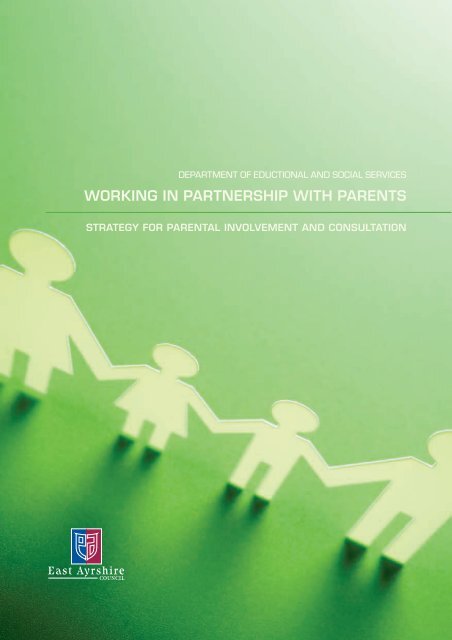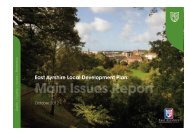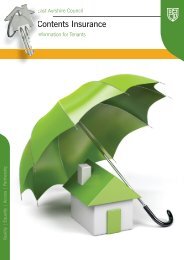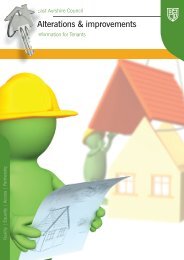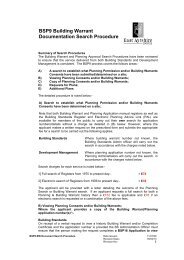WORKING IN PARTNERSHIP WITH PARENTS - East Ayrshire Council
WORKING IN PARTNERSHIP WITH PARENTS - East Ayrshire Council
WORKING IN PARTNERSHIP WITH PARENTS - East Ayrshire Council
Create successful ePaper yourself
Turn your PDF publications into a flip-book with our unique Google optimized e-Paper software.
DEPARTMENT OF EDUCTIONAL AND SOCIAL SERVICES<br />
<strong>WORK<strong>IN</strong>G</strong> <strong>IN</strong> <strong>PARTNERSHIP</strong> <strong>WITH</strong> <strong>PARENTS</strong><br />
STRATEGY FOR PARENTAL <strong>IN</strong>VOLVEMENT AND CONSULTATION
<strong>IN</strong>TRODUCTION<br />
The Scottish Schools (Parental Involvement) Act 2006 published in May 2006, is about<br />
improving the involvement of parents in their own child’s education and in the life of the school.<br />
It aims to help parents to be:<br />
• Involved with their child’s education and learning<br />
• Welcomed as an active participant in the life of the school<br />
• Encouraged to express their views on school education generally<br />
The Act offers the Department of Educational & Social Services the opportunity to build on the<br />
many strengths in parental involvement that have been achieved through the work of School<br />
Boards, Parent Teacher Associations and other groups within <strong>East</strong> <strong>Ayrshire</strong> schools.<br />
The promotion of parental involvement is a key priority within the Department of Educational<br />
and Social Services. The Department acknowledge that parents, carers and families are<br />
by far the most important influences on children’s lives. Parents are the first and<br />
ongoing educators of their own children and know them best. The Department<br />
recognises this and values greatly the contribution that parents and other family<br />
members make in supporting their children’s learning, both at school and at home.<br />
3
L<strong>IN</strong>KS <strong>WITH</strong> OTHER LEGISLATION AND POLICY<br />
The Scottish Schools (Parental Involvement) Act 2006 should be seen within the broad context<br />
of legislation and policy which supports children and families. In particular, it reflects the vision of<br />
Scottish Ministers’ that Scotland’s children and young people will become successful learners,<br />
confident individuals, responsible citizens and effective contributors by being safe, nurtured, active,<br />
healthy, achieving, included, respected and responsible.<br />
Some of the main themes of the Act and how these complement other legislation and policies are<br />
set out below. In particular, the Act builds on the:<br />
• Education (Scotland) Act 1980<br />
• Standards in Scotland’s Schools etc. (Scotland) Act 2000 (the “2000 Act”);<br />
• Children (Scotland) Act 1995 (the “1995 Act”)<br />
• The Education (Disability Strategies and Pupils’ Educational Records)(Scotland) Act 2002<br />
• The Education (Additional Support for Learning) (Scotland) Act 2004<br />
• Disability Discrimination Act 1995 (as amended) Disability Discrimination Act 2005<br />
• Race Relations (Amended) Act 2000<br />
• Equality Act 2006<br />
• Local Government in Scotland Act 2003<br />
PURPOSE OF THE STRATEGY<br />
This strategy has been produced in order to provide a supportive and consistent framework in<br />
which all schools can actively engage parents/carers meaningfully in the education of their<br />
children, and in the wider life of the school. Across schools in <strong>East</strong> <strong>Ayrshire</strong>, experience<br />
demonstrates that parents who take on a supportive role in their children’s learning make a<br />
difference in improving attainment, achievement and behaviour. Schools need parent/carer<br />
support to help provide each child and young person with the highest quality of education and to<br />
encourage all schools to be ambitious and excellent.<br />
4
KEY PR<strong>IN</strong>CIPLES OF THE STRATEGY<br />
This strategy will ensure that:<br />
• Parents develop an increasing ability to influence the learning of their child<br />
• Recognition is given that parents/carers, families, staff, pupils and other services and<br />
agencies have skills and attributes to contribute as partners in education<br />
• Parental involvement is inclusive and encourages all parents and carers to participate as<br />
members of the Parent Forum<br />
• Recognition of the fact that some groups of parents/carers need support to overcome the<br />
barriers they face in fully supporting their child’s education. This also recognises the<br />
additional support recurring for those responsible for looked after children and looked after<br />
and accommodated children<br />
• Recognition of the valuable role representative groups of parents such as Parent Forums,<br />
Parent <strong>Council</strong>s, and other Parent Associations contribute to developing good relationships<br />
between home and school<br />
THE AUTHORITY’S COMMITMENT<br />
The <strong>Council</strong> is committed to providing an excellent and continually improving education service. All<br />
parents/carers should have high expectations of the learning and teaching that is provided for<br />
their children, whatever their age, abilities, interests or talents. The Department commitment<br />
extends to ensuring that all learners of all ages are enabled to gain the qualifications and<br />
experiences necessary for the next steps in their lives. This commitment includes all schools,<br />
early years establishments and community learning.<br />
All schools in <strong>East</strong> <strong>Ayrshire</strong> aspire to achieve the very best for all children by providing educational<br />
experiences through A Curriculum for Excellence and other national developments that will enable<br />
children and young people to develop their capacity to become successful learners, confident<br />
individuals, effective contributors and responsible citizens. In supporting this commitment the<br />
authority will work in partnership with schools, learners, parents/carers, and other agencies,<br />
including those responsible for corporate parenting, to ensure children and young people are<br />
nurtured, safe, active, healthy, achieving, included, respected and responsible.<br />
5
<strong>East</strong> <strong>Ayrshire</strong> endorses the Scottish Government policy which states that, as a corporate parent,<br />
local authorities in discharging their responsibilities, have a challenging role, to act like good<br />
parents and it must be a key priority for all service providers to keep the needs of the child or<br />
young person at the centre of everything they do for all looked after children and young people and<br />
children and young people who are looked after and accommodated.<br />
STRENGTHEN<strong>IN</strong>G PARENTAL <strong>IN</strong>VOLVEMENT<br />
The Department’s strategy for promoting and enhancing parental engagement is founded on<br />
three main strands of activity which lie at the core of the Scottish Schools (Parental Involvement)<br />
Act 2006:<br />
• Learning at home<br />
• Home/school partnership<br />
• Parental representation<br />
The Department will:<br />
• Establish a Parent <strong>Council</strong> Steering Group to provide a forum to allow parents to express<br />
their views on a range of departmental policies and guidelines.<br />
• Continue to actively seek new and innovative ways to remove barriers to parental<br />
involvement and to encourage, nurture and support, parental engagement at all level with<br />
their child’s learning.<br />
• Establish, and provide support to a network of parental involvement and consultation<br />
across all Learning Partnerships.<br />
• Ensure effective mechanisms for communication are in place at authority and individual<br />
establishment level to enable all parents to access key information and advice on school<br />
education, and to provide this in a variety of formats that best suits the needs of parents.<br />
• Through Learning Partnerships, focus on ensuring better co-ordination of services at local<br />
level for the benefit of all children and young people, but particularly those most vulnerable.<br />
• Ensure a range of clear and succinct policies are in place at authority and individual<br />
establishment level to guide parents and carers in their key roles in supporting and<br />
engaging in children’s learning.<br />
6
• Provide guidance and direction to schools to ensure that policies on key activities such as<br />
homework and parental involvement and consultation are designed to strengthen parental<br />
engagement and increase the confidence of parents.<br />
• Ensure that the principles of personal learning planning within A Curriculum for Excellence are<br />
thoroughly embedded in all schools.<br />
• Provide central support mechanisms to establish continuing support for training for Parent<br />
<strong>Council</strong>s.<br />
• Engage Parent <strong>Council</strong> members more fully in the recruitment process for Head Teachers<br />
and Deputes and provide appropriate training to enable council members to fulfil their role.<br />
Learning at Home<br />
The school will:<br />
• Value the learning that takes place in the home by actively seeking the views of<br />
parents/carers on their child’s progress in learning.<br />
• Encourage an atmosphere in which parents/carers feel able to share their views of their<br />
child’s educational progress with teachers in as many different ways as possible.<br />
• Identify a member of staff responsible for parental involvement, engagement and<br />
consultation in each school and early years establishment.<br />
• Develop activities and practices that encourage and support parent/child activity and help<br />
reduce the barriers to parental involvement in children’s learning and the wider life of the<br />
school/nursery.<br />
• Continue to develop a variety of methods for sharing information and communicating with<br />
parents.<br />
Home/School Partnership<br />
The school will:<br />
• Ensure that communication and consultation with parents and carers provides access to<br />
key information and advice in a variety of formats that are appropriate for their needs.<br />
7
• Provide specific and detailed advice and information to parents on their child’s progress.<br />
• Involve parents fully in reviewing the progress of their children and planning next steps in their<br />
learning.<br />
• Ensure the personal learning planning process promotes dialogue between pupils, parents<br />
and teachers.<br />
• Work with colleagues at all key transition stages to ensure full engagement with, and<br />
involvement of parents.<br />
Parental representation<br />
The school will:<br />
• Consult with the Parent Forum as to the format of the Parent <strong>Council</strong> and support the<br />
establishment of the Parent <strong>Council</strong>.<br />
• Support the operation and ongoing work of the Parent <strong>Council</strong> as described within the Act.<br />
• Continue to promote a shared responsibility between schools, parents, carers, partner<br />
organisations and the community in working together to educate children.<br />
• Support and develop ways of providing information that will help the community of parents<br />
engage with the school and their children’s learning.<br />
• Strive to overcoming any barriers to parental involvement through partnership working to<br />
ensure equality and social justice.<br />
• Enhance the sense of team work and empowered decision making at local level between<br />
services, agencies and parents.<br />
• Secure Best Value for the use and deployment of resources.<br />
8
EQUAL OPPORTUNITIES<br />
Ensuring equality in the practices of the Department lies at the heart of the strategy for parental<br />
involvement. The Department is committed not only to providing equal access to opportunities<br />
for parental involvement and engagement, but to track any discrimination, intended or otherwise,<br />
against parents on account of race, religion, disability, sexual orientation, socio-economic status<br />
or age. The Department recognises that ensuring equality also involves making special efforts in<br />
its actions to provide for those who may have most to overcome in order to play their full role.<br />
As part of the strategy, the Department will take steps through training, raising awareness of the<br />
range of barriers, sharing good practice in overcoming barriers, and other measures, to ensure<br />
that all staff who have contact with parents understand and provide for those parents who<br />
experience difficulty in becoming involved as a result of significant barriers, including for example:<br />
• Time - Parents are busy people. Parents might be working either full time or part time,<br />
bringing up young children on their own or have more than one child attending different<br />
schools.<br />
• Family circumstances - Families have different needs and pressures impacting on their<br />
ability to become involved. Parents may find it difficult to attend meetings if they have a child<br />
who is disabled, have a baby or other caring responsibilities. The pressures of work shifts<br />
and/or working away from home also create pressure on time. In addition, a complex family<br />
structure with parents who are separated may also place additional pressure on parents.<br />
• Geography - The area parents live in can be a significant factor in how parents are able to<br />
be involved with school based activities. Parents and pupils may have to travel some distance<br />
to the school and may have difficulty with transport. This may be exacerbated where children<br />
are being educated some distance from their home.<br />
• Parents perceptions - Parents may feel uncomfortable in school surroundings for a number<br />
of reasons, including their own previous experience of school or their cultural background.<br />
These perceptions can be a real barrier to parents becoming involved.<br />
This strategy also recognises the fact that Looked After and Accommodated children and young<br />
people face many barriers to their success in education. Children who are looked after should<br />
have the same education and development opportunities as all other children. The strategy will<br />
demonstrate the Department’s commitment to providing help, encouragement and support to<br />
address additional support needs or to compensate for previous deprivation or disadvantage.<br />
The Department will work with parents, foster carers and residential workers in relation to<br />
children who are looked after.<br />
9
Most parents of looked after children retain their parental rights and responsibilities. Parents<br />
who do not live with their children may still wish to be involved in their education. The Department<br />
is therefore committed to working in partnership with foster parents, and where possible, the<br />
natural parents, to encourage them to support the child or young person to maximise their<br />
educational potential.<br />
APPO<strong>IN</strong>TMENT OF SENIOR STAFF<br />
The appointment of a Head Teacher or Depute Head Teacher is of crucial importance to a school<br />
and its community. Parents have a particular role to play in the process. Parent <strong>Council</strong>s, as the<br />
parents’ representatives have a right to be involved in the recruitment process if a permanent<br />
appointment is to be made. This involvement will extend throughout the appointment process.<br />
When a position becomes vacant, the Department will invite the Parent <strong>Council</strong> to nominate two<br />
members, both of whom must be members of the parent forum, to assist the department in<br />
drawing up the person specification, selecting a short leet and interviewing the candidates.<br />
Training on all aspects of the recruitment procedure will be provided to members of the Parent<br />
<strong>Council</strong>.<br />
MONITOR<strong>IN</strong>G AND EVALUATION<br />
In implementing a strategy for parental involvement, the ultimate measure of success must be<br />
based on achieving outcomes for children that result in them being safe and happy at school and<br />
that provide them with opportunities to support them perform to their full potential. In addition,<br />
HMIE’s quality indicators outlined in ‘How good is our partnership with parents?’ and key indicators<br />
selected from ‘How Good is Our School 3’ will be used at authority and school level as a starting<br />
point of self-evaluation.<br />
COMPLA<strong>IN</strong>TS<br />
The <strong>Council</strong> has a clear Customer Care and Complaints procedure which sets out the <strong>Council</strong>’s<br />
commitment to providing high quality services for all the people it serves. The Customer First<br />
Service Commitment sets out the standards of customer care service you can expect from <strong>East</strong><br />
<strong>Ayrshire</strong> <strong>Council</strong>.<br />
10
Practices within the Department of Education and Social Services are firmly rooted in these<br />
guidelines and customer standards. Staff in schools and throughout the Department are here<br />
to help you and your child with any questions or concerns you may have.<br />
The Department operates a customer care policy, details of which are outlined in the leaflet<br />
“Complaints Procedures for Education Services” available in all schools, educational<br />
establishments and offices, libraries, via the <strong>Council</strong>’s website or by telephoning 01563 576109.<br />
Likewise if you wish to forward a positive comment or compliment on the service, please do so in<br />
the same way.<br />
If you are not satisfied with <strong>Council</strong>’s response to your complaint you may wish to refer your<br />
complaint to:<br />
Scottish Public Services Ombudsman,<br />
4 Melville Street, Edinburgh, EH3 7NS<br />
Tel: 0800 377 7330<br />
e-mail: ask@spso.org.uk<br />
www.spso.org.uk<br />
11
© <strong>East</strong> <strong>Ayrshire</strong> <strong>Council</strong> 2009<br />
Designed and produced by EAC Graphics Section ra/0109/??


